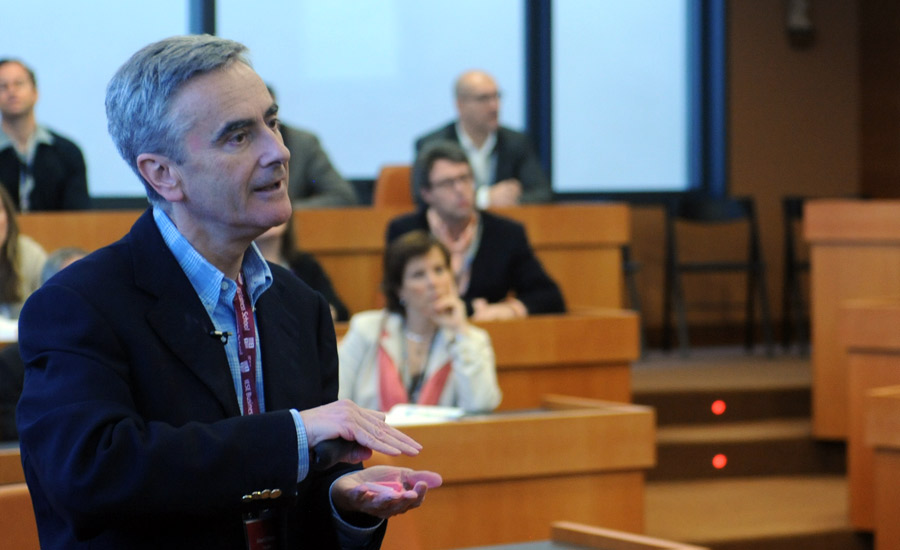
More than 13.5 million working days are lost every year due to stress in the UK alone. This costs employers £370 million yearly. Companies need to take action, not only for their employee’s well-being, but their bottom line too.
Second-year MBAs are preparing themselves for the road with a new course, “Stress Management, Focus and Well-being” taught by medical doctor and mental health expert Professor Alberto Ribera.
“Our MBAs need to be able to maintain a stable and focused mind, even in turmoil.” says Ribera. “We are giving them the tools to bring greater calm and clarity to get results.”
Finding Your Inner Balance
After undergoing a series of stressful professional and personal challenges, Norwegian MBA student, Magnus Johansen, realized managing stress was an area he could really improve in.
“Unless I figured out how to deal with living and working in such a stressful environment, my life would most likely be significantly shortened,” he says.
The course has a unique, personal approach. “We all assess stressors differently,” says Johansen. And there’s not just negative stress.
“I’ve learned how to gauge whether certain ‘stressors” are really negative. It’s about how I choose to interpret them,” he says. “Ultimately, performance comes from within. Without a balance from within, performance will be shaken in times of challenge.”
MBA student and U.S. citizen, Jessica Engels, sees the course as a means to “build the emotional tools we need to handle the difficulties and pressure that will surely come with our post-MBA careers.” Engel’s self-awareness has grown thanks to the course tools and exercises.
“What will really set us apart when faced with stress is how we choose to deal with it. Developing good coping habits now, puts us ahead of the curve and helps protect our companies, our jobs, those around us, and – most importantly – ourselves.”
The class includes lectures on the scientific understanding of stress, case discussions to illustrate strategies to prevent burnout, and tools to build resilience and healthy habits.
50 percent of the course is dedicated to practice different physical and mental exercises such as sophrology and mindfulness based techniques for stress reduction guided by qualified experts.
“We spend half the time actually putting the techniques into practice – and that makes them stick,” says MBA student Sam Glasswell, U.K. “The students really appreciate this. The practical element really helps and gives you something to put into practice outside of class.”
The students were given a test at the beginning and the end of the course to measure anxiety. At the end of the six weeks, scores for anxiety had been reduced by an average of 30 percent.
Advice for Executives in the Field
Though the course is for students, Ribera offers advice for executives out in the field. “A great misconception is that we are able to multitask. Switching attention between tasks has a great cost in stress, time, errors and memory.”
-
Self-awareness – we are all human. We all get tired. Take care of your body, mind and spirit. And recognize initial symptoms of stress. Don’t compromise on fundamental healthy lifestyle habits: sleep, exercise, diet, etc. Develop routines to make sure you invest in what is needed to renew your physical, psychological and spiritual state. Learn about techniques that help to disconnect and relax.
-
Mindfulness / Focus – be in the moment. If you focus your attention, dealing with a multitude of problems becomes somewhat easier. Do one thing at a time, and do not start the next one until you finish. Turn off digital disruption to your day. Many studies show that dividing attention due to technology decreases productivity – and increase stress. So switch off phones, tablets, computers, email alarms and the like – unless you need them for the meeting or the task you are dealing at that moment.
-
Learn to say NO – say no deadlines you cannot fulfill. Say no to subordinates and colleagues that delegate back. Say No to urgent things that prevent you to take care of important ones.
-
Connect with others – we all need contact with others. Connect with your family and loved ones first.
- Seek help – ask for help whenever needed
“After all,” says Ribera, “stress is related less to the external environment, but to our internal world and our perception of reality. One leader’s stress is another’s idea of relaxation. So we have to train our internal abilities and our self-regulation to cope with pressure.”